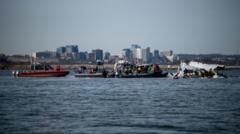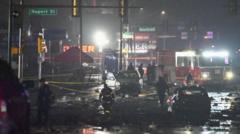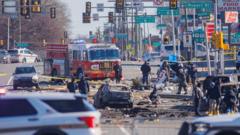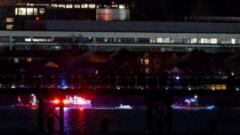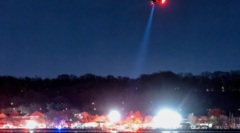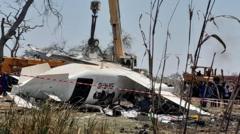A Boeing 737-800 operated by Jeju Air crashed while landing at Muan International Airport, raising questions about a possible bird strike along with bad weather as contributing factors. With 179 casualties, this incident marks South Korea's deadliest aviation disaster.
Investigation Underway: Officials Probe Causes Behind Tragic South Korea Plane Crash
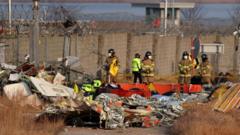
Investigation Underway: Officials Probe Causes Behind Tragic South Korea Plane Crash
Following a disastrous plane crash that claimed over 170 lives in South Korea, authorities are examining potential causes, including bird strikes.
More than 170 people have tragically lost their lives after a plane incident occurred during landing at Muan International Airport in southwestern South Korea this past Sunday morning. The Jeju Air flight, which was returning from Bangkok, Thailand, carried a total of 181 individuals on board. Currently, the death toll stands at 179, with two crew members rescued from the wreckage.
Authorities are actively investigating the causes of this catastrophic crash, with fire officials suggesting that a bird strike, compounded by adverse weather conditions, may have played a role. However, experts caution that multiple factors could be involved.
As the investigation unfolds, it was reported that the flight, identified as 7C2216, was operating a Boeing 737-800, the preferred budget airline for many in South Korea. The plane is said to have arrived at Muan around 09:00 local time (00:00 GMT), attempting to land when air traffic control issued a bird strike warning. Shortly after, the pilot allegedly declared a Mayday, prompting directions to land from an alternative approach.
Reports from a passenger indicated that a bird was lodged in the wing, complicating the landing procedure, which led officials to speculate this could have motivated the pilot's urgent request to land. A video circulating online appears to show the plane landing without utilizing its wheels, skidding across the runway before colliding into a wall, resulting in a fierce conflagration. Eyewitness accounts described hearing a heavy explosion followed by subsequent detonations. Fire crews have since quelled the flames.
In a recent briefing, the chief of the Muan fire department confirmed the tail of the aircraft remained identifiable among the debris, while the rest of the plane was unrecognizable. He reiterated that investigations were focusing on both bird strikes and difficult weather conditions assessment. The flight data and voice recorders have been retrieved for further analysis.
Jeju Air management has stated that the incident did not relate to any maintenance deficiencies. They also disclosed that the flight’s lead pilot, who has over 6,800 hours of experience, had been configuring flights since 2019.
This accident is marked as the deadliest in South Korea's aviation history. Among the passengers were 175 civilians and six crew members, with the majority thought to be nationals returning from a holiday in Thailand. Tragically, the death toll includes five minors, and authorities have thus far identified at least 88 bodies.
Following the crash, more than 1,500 emergency personnel mobilized to the scene, comprising firefighters and police, endeavoring to recover remains and analyze crash materials.
Acting President Choi Sang-mok has instituted a special disaster zone in Muan, enabling the release of government support for victims and their families. Flights in and out of Muan have been halted indefinitely, while bereaved family members gather at the airport seeking clarity regarding their loved ones.
To accommodate grieving families, local authorities and the Red Cross have erected temporary structures where they can mourn privately. The atmosphere remains somber at the airport, with sounds of anguish resonating, as frustrations mount over the lengthy identification process of the deceased.
Jeju Air has publicly apologized for the incident, with their CEO stating this marks the only fatal accident since the airline's inception in 2005. Meanwhile, Boeing has conveyed its condolences. The South Korean government is observing a seven-day period of national mourning, with flags at official offices lowered in remembrance of the victims.

